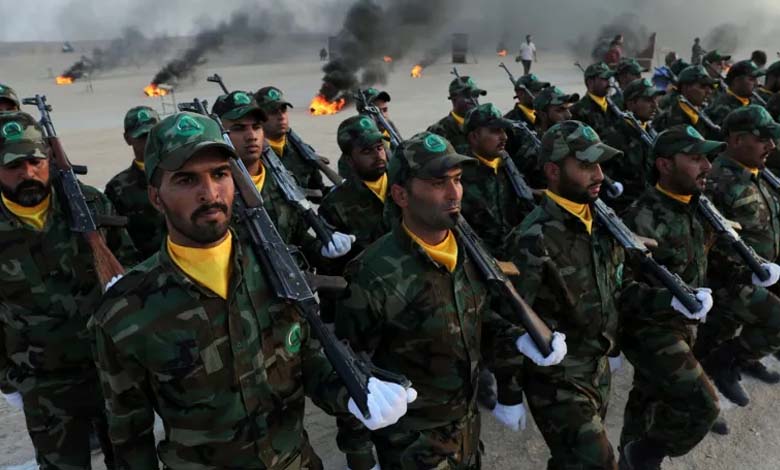Factional Struggles Dividing the Popular Mobilization Forces
Iran usually intervenes to stabilize the situation within the Popular Mobilization Forces (PMF) to ensure its interests and secure its influence by attempting to restore balance and curb chaos and divisions.

Iraqi media sources reported that the head of the PMF, Faleh al-Fayyadh, reversed his decision to dismiss Hussein Faleh, known as Abu Zainab al-Lami, from his position as head of the security and discipline directorate in the PMF. Social media accounts, some loyal to the PMF and others opposing it, have spoken of a power and influence struggle.
It is unclear what role Iran plays in these conflicts, but it usually intervenes to stabilize the situation to ensure its interests and secure its influence by attempting to restore balance and curb chaos and divisions. Al-Lami is considered one of its close associates, having been closely linked to the late Quds Force commander General Qassem Soleimani, who was the architect of Iran’s external expansion strategy and “dirty” operations, and had strong influence over the pro-Tehran Shia militias.
This relationship gave the head of security and discipline in the PMF vast influence and Iranian protection that even exceeded al-Fayyadh’s authority, indicating an internal struggle for interests and influence.
Faleh al-Fayyadh, founder of the Atta Movement and former advisor to the Iraqi National Security Council, is loyal to Iran, but al-Lami appears closer and more loyal and could be a candidate to succeed him if Tehran decides to replace al-Fayyadh for political reasons.
Although the issue of al-Fayyadh’s succession has not been raised, Iran has its own calculations on which it bases the rotation of positions within the PMF to ensure its influence.
On social media, some accounts have spoken of a power struggle within the PMF, indicating that the decision to dismiss al-Lami and reverse it in less than 24 hours shows that Abdulaziz al-Muhammadawi, known as Abu Fadak, the chief of staff of the PMF, began to feel the danger of dismissal. He played a role in reinstating the head of security and discipline to his position.
According to Iraqi sources, pressures and angry reactions from leaders of the pro-Iran Shia militias and politicians forced al-Fayyadh to reinstate the head of security and discipline to his position.
A “Loyal Patriot” account wrote in a post: “After Faleh al-Fayyadh decided to dismiss Abu Zainab al-Lami from the PMF security directorate, a senior leader in the brigades called al-Fayyadh and requested to issue a statement denying the news and immediately retract the dismissal, but al-Fayyadh refused.”
He added: “As a result, the brigades sent more than 15 armed vehicles carrying heavy weapons that surrounded the security directorate and took control of its headquarters. They informed al-Fayyadh that ‘no one can take Abu Zainab’s position’. The vehicles were seen at night surrounding the directorate in front of people’s eyes,” adding that “the vehicles are currently in the back garage of the security directorate and the brigade’s militants control the building. Prime Minister Mohammed Shia al-Sudani called Abu Fadak to negotiate with them and calm the situation.”
The head of the PMF had issued a decision on Thursday to dismiss al-Lami from his position and appoint the deputy head of PMF security, Ali al-Zaidi, in his place. The reasons for the dismissal were not clear at the time, but the decision likely came amid internal conflicts and divisions within the military coalition that includes the armed Shia factions integrated into the Iraqi armed forces but considered by many Iraqis as a parallel army with high armament and broad security powers.
In theory, these paramilitary forces are subject to the authority of the commander-in-chief of the Iraqi armed forces, Prime Minister Mohammed Shia al-Sudani, but previous incidents have shown that they can rebel against his decisions and that their loyalty to Tehran is greater than their loyalty to the Iraqi army.
Al-Lami is popular among these armed militias and was a member of the Kataeb Hezbollah in Iraq, one of the largest Iraqi factions accused by the United States of carrying out attacks on its forces and interests in Iraq. He led the attack on the US embassy in Baghdad in 2020 after the death of Qassem Soleimani and Abu Mahdi al-Muhandis, deputy head of the PMF, in a US drone strike.
As head of security for the PMF, al-Lami was sanctioned by the United States in 2019 for his alleged role in issuing orders to use deadly force against anti-government protesters during the 2019 protests, which demanded Iran withdraw its hand from Iraq and called for curbing its influence.
More than 600 protesters were killed during these protests, and many activists were assassinated, kidnapped, and tortured during and after this period, in operations attributed to the pro-Iran militias, including the PMF, although al-Lami denied any role in the killings.
The reversal of al-Fayyadh’s decision to dismiss al-Lami indicates that he is not the sole decision-maker within the PMF despite his vast influence and closeness to Iran. It is also likely that Tehran intervened to reinstate the head of security and discipline to his position.
It is possible that al-Fayyadh made the decision to dismiss without consulting Iranian decision-making circles, as the PMF is supervised by Quds Force commander General Esmail Qaani.












